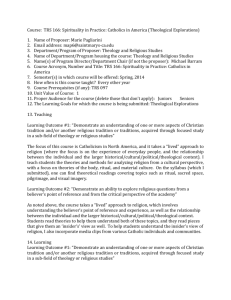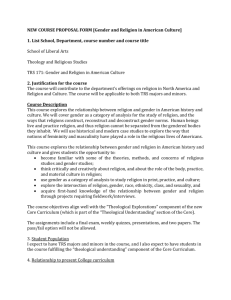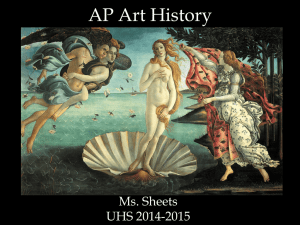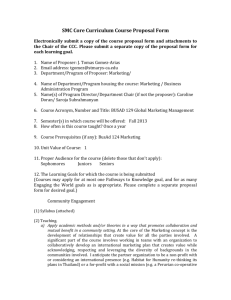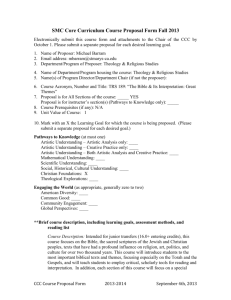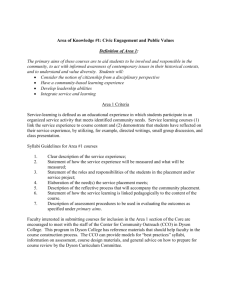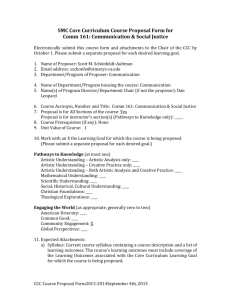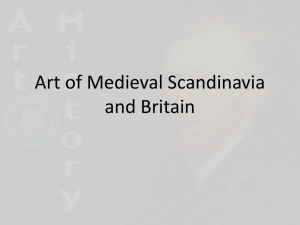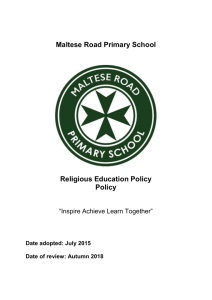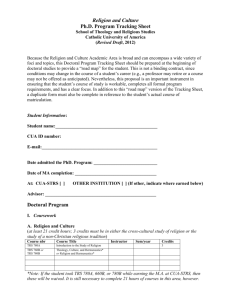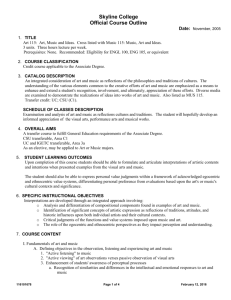Proposal
advertisement
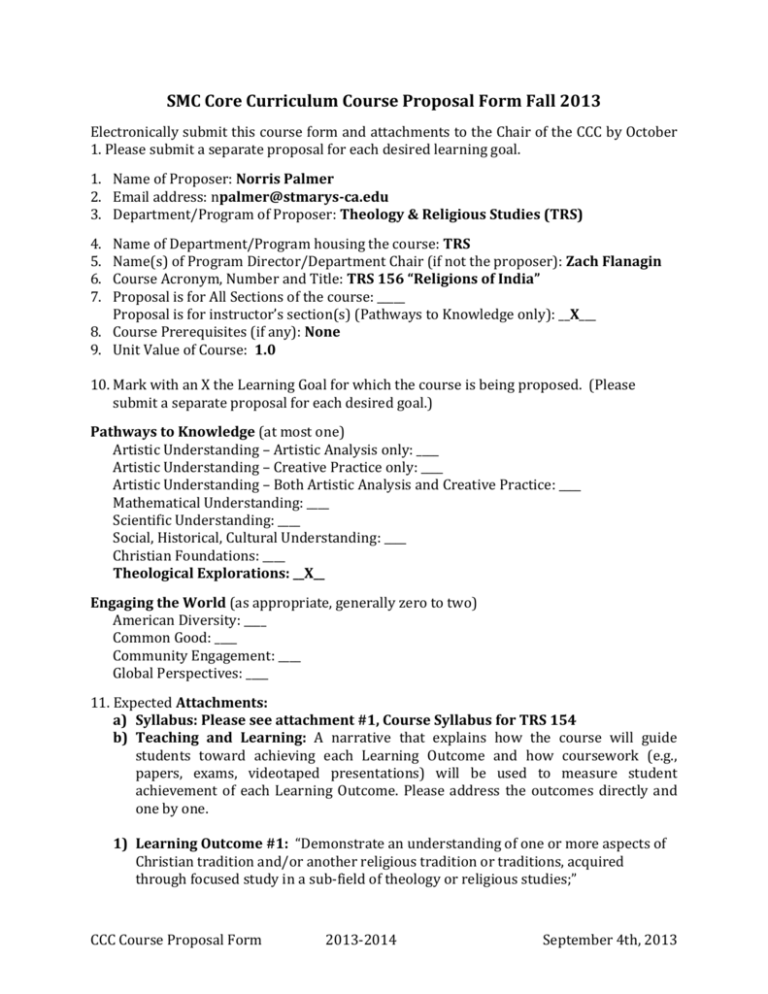
SMC Core Curriculum Course Proposal Form Fall 2013 Electronically submit this course form and attachments to the Chair of the CCC by October 1. Please submit a separate proposal for each desired learning goal. 1. Name of Proposer: Norris Palmer 2. Email address: npalmer@stmarys-ca.edu 3. Department/Program of Proposer: Theology & Religious Studies (TRS) 4. 5. 6. 7. Name of Department/Program housing the course: TRS Name(s) of Program Director/Department Chair (if not the proposer): Zach Flanagin Course Acronym, Number and Title: TRS 156 “Religions of India” Proposal is for All Sections of the course: _____ Proposal is for instructor’s section(s) (Pathways to Knowledge only): __X___ 8. Course Prerequisites (if any): None 9. Unit Value of Course: 1.0 10. Mark with an X the Learning Goal for which the course is being proposed. (Please submit a separate proposal for each desired goal.) Pathways to Knowledge (at most one) Artistic Understanding – Artistic Analysis only: ____ Artistic Understanding – Creative Practice only: ____ Artistic Understanding – Both Artistic Analysis and Creative Practice: ____ Mathematical Understanding: ____ Scientific Understanding: ____ Social, Historical, Cultural Understanding: ____ Christian Foundations: ____ Theological Explorations: __X__ Engaging the World (as appropriate, generally zero to two) American Diversity: ____ Common Good: ____ Community Engagement: ____ Global Perspectives: ____ 11. Expected Attachments: a) Syllabus: Please see attachment #1, Course Syllabus for TRS 154 b) Teaching and Learning: A narrative that explains how the course will guide students toward achieving each Learning Outcome and how coursework (e.g., papers, exams, videotaped presentations) will be used to measure student achievement of each Learning Outcome. Please address the outcomes directly and one by one. 1) Learning Outcome #1: “Demonstrate an understanding of one or more aspects of Christian tradition and/or another religious tradition or traditions, acquired through focused study in a sub-field of theology or religious studies;” CCC Course Proposal Form 2013-2014 September 4th, 2013 a) Teaching (related to Outcome #1): Relative to the first learning outcome for the Theological Explorations learning goal, students in this course study a number of religious traditions (Hinduism, Islam, Buddhism, Sikhism, Jainism, Zoroastrianism, and Christianity) within a wide variety of their historical and cultural settings. Our study examines both individual traditions and the complex history of their interaction. We also examine how religions interact with political, social, and economic systems as well as look at examples of religious pluralism together with its promises and problems in historic and contemporary settings within India and beyond. b) Learning (related to Outcome #1): As described in the syllabus, this course includes a variety of assessment mechanisms (exams, online conversations, analysis of site visits, and term projects) to demonstrate that the learning outcomes have been met. With respect to this first learning outcome, a range of questions and essay prompts on the mid-term and the final exam together with quizzes and aspects of their final project test students’ command not only of basic data points related to these traditions but also how they have interacted with political, social, and economic systems as well. 2) Learning Outcome #2: “Demonstrate an ability to explore religious questions from a believer’s point of reference and from the critical perspective of the academy.” a) Teaching: (related to Outcome #2): Relative to the second learning outcome for the Theological Explorations learning goal, students in this course are taught (via lecture, primary and secondary texts, site visits, video, etc.) how the various religions of India and their various forms are understood from within a believer’s perspective. Students are also taught how it may be approached from the critical perspective of the academy by examining it through the lens of the academic study of religion via lecture and secondary literature. b) Learning: (related to Outcome #2): This learning outcome is assessed by means of examination, analysis of site visits, quizzes, and the final project, all of which require students not only to represent aspects of the tradition from a believer’s point of view but also to apply one or more critical perspectives from within the field of religious studies as presented within class and/or secondary literature. One of the central essay questions on the final exam requires students to provide an a believer’s perspective (from the traditions examined) on a topic of current social concern (e.g., domestic violence, addiction, etc.) and then critically appraise this perspective from within the academic study of religion by referencing the secondary literature from this field as presented in the course. CCC Course Proposal Form 2013-2014 September 4th, 2013
